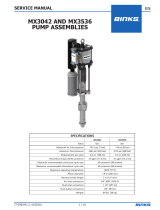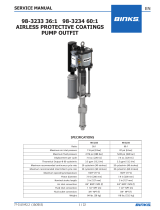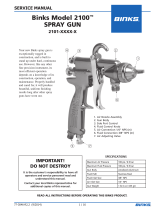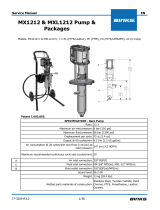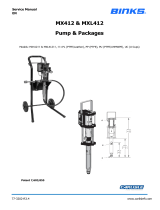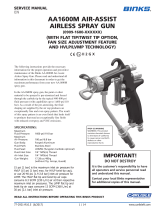Page is loading ...

EN
77-3040-R1.2 (10/2014) 1 / 12
SERVICE MANUAL
PX1304 POGO
PUMP ASSEMBLIES
SPECIFICATIONS
PX1304-5 PX1304-8
Ratio: 4:1
Maximum air inlet pressure: 72.5 psi [5 bar] 116 psi [8 bar]
Maximum fluid pressure: 290 psi [20 bar] 500 psi [34.5 bar]
Displacement per cycle: 2.7 oz [81 CC]
Theoretical Output @ 60 cycles/min: 1.3 gpm [4.9 l/m]
Maximum recommended continuous cycle rate: 20 cycles/min. [40 strokes]
Maximum recommended intermittent cycle rate: 40 cycles/min. [60 strokes]
Maximum operating temperature: 160°F [71° C]
Piston diameter: 3.3 in (85 mm)
Nominal motor stroke: 3 in [75 mm]
Air inlet connection: 3/8" NPS / BSPP (female)
Outlet size: 1/2" NPT (female)
Weight: 12.6 Lb [5.7 Kg]

EN
77-3040-R1.2 (10/2014)2 / 12
Binks reserves the right to modify equipment specification without prior notice.
In this part sheet, the words WARNING, CAUTION and NOTE are used to
emphasize important safety information as follows:
Hazards or unsafe practices which
could result in minor personal injury,
product or property damage.
!
CAUTION
Hazards or unsafe practices which
could result in severe personal
injury, death or substantial property
damage.
!
WARNING
Important installation, operation or
maintenance information.
NOTE
Read the following warnings before using this equipment.
IT IS THE RESPONSIBILITY OF THE EMPLOYER TO PROVIDE THIS INFORMATION TO THE OPERATOR OF THE EQUIPMENT.
FOR FURTHER SAFETY INFORMATION REGARDING THIS EQUIPMENT, SEE THE GENERAL EQUIPMENT SAFETY BOOKLET (77-5300).
!
WARNING
DE-ENERGIZE, DEPRESSURIZE, DISCONNECT AND
LOCK OUT ALL POWER SOURCES DURING
MAINTENANCE
Failure to De-energize, disconnect and lock out all power
supplies before performing equipment maintenance could
cause serious injury or death.
OPERATOR TRAINING
All personnel must be trained before operating finishing
equipment.
EQUIPMENT MISUSE HAZARD
Equipment misuse can cause the equipment to rupture,
malfunction, or start unexpectedly and result in serious
injury.
PROJECTILE HAZARD
You may be injured by venting liquids or gases that are
released under pressure, or flying debris.
PINCH POINT HAZARD
Moving parts can crush and cut. Pinch points are basically
any areas where there are moving parts.
INSPECT THE EQUIPMENT DAILY
Inspect the equipment for worn or broken parts on a
daily basis. Do not operate the equipment if you are
uncertain about its condition.
READ THE MANUAL
Before operating finishing equipment, read and
understand all safety, operation and maintenance
information provided in the operation manual.
WEAR SAFETY GLASSES
Failure to wear safety glasses with side shields could
result in serious eye injury or blindness. NEVER MODIFY THE EQUIPMENT
Do not modify the equipment unless the manufacturer
provides written approval.
KNOW WHERE AND HOW TO SHUT OFF THE
EQUIPMENT IN CASE OF AN EMERGENCY
HIGH PRESSURE CONSIDERATION
High pressure can cause serious injury. Relieve all
pressure before servicing. Spray from the spray gun, hose
leaks, or ruptured components can inject fluid into your
body and cause extremely serious injury.
NOISE HAZARD
You may be injured by loud noise. Hearing protection
may be required when using this equipment.
STATIC CHARGE
Fluid may develop a static charge that must be dissipated
through proper grounding of the equipment, objects to be
sprayed and all other electrically conductive objects in the
dispensing area. Improper grounding or sparks can cause a
hazardous condition and result in fire, explosion or electric
shock and other serious injury.
PROP 65 WARNING
WARNING: This product contains chemicals known to
the State of California to cause cancer and birth
defects or other reproductive harm.
KEEP EQUIPMENT GUARDS IN PLACE
Do not operate the equipment if the safety devices have
been removed.
PACEMAKER WARNING
You are in the presence of magnetic fields which may
interfere with the operation of certain pacemakers.
PRESSURE RELIEF PROCEDURE
Always follow the pressure relief procedure in the
equipment instruction manual.
AUTOMATIC EQUIPMENT
Automatic equipment may start suddenly without
warning.

EN
77-3040-R1.2 (10/2014) 3 / 12
! WARNING
HIGH PRESSURE CAN CAUSE SERIOUS INJURY IF EQUIPMENT IS INSTALLED OR USED INCORRECTLY—
READ, UNDERSTAND, AND OBSERVE ALL WARNINGS AND INSTRUCTIONS IN THIS MANUAL.
INSTALL, OPERATE OR SERVICE THIS EQUIPMENT ONLY AFTER
ALL INSTRUCTIONS ARE CLEARLY UNDERSTOOD.
It is the responsibility of the employer to place this information into the hands of the operator.
!
CAUTION
Hazards or unsafe practices which
could result in minor personal injury,
product or property damage.
!
WARNING
Hazards or unsafe practices which
could result in severe personal injury,
death or substantial property
damage.
NOTE
Important installation, operation or
maintenance information.
AVOID STATIC SPARKING
1. Use Binks NO-WIRE conductive hose
in all airless spraying operations. Be
sure the gun and hose have
continuity.
2. Make sure the pump is grounded.
NEVER operate the unit when it is on
a non-grounded platform.
3. When flushing or cleaning with a
combustible solvent, always use an
open metallic container for receiving
the waste solvent. Ground the solvent
receptacle.
4. ALWAYS remove spray tip when
flushing the system. Operate the
pump at the lowest possible pressure.
Bonding Wire,
Gun To Solvent Container
Conductive Hose
To Airless Pump
Open
Metallic
Waste Solvent
Container,
Grounded
GENERAL WARNINGS
1. NEVER leave a pressurized sprayer
unattended.
2. Periodically inspect all hoses for leaks
and/or abrasions and tighten all
connections before use. DO NOT
ATTEMPT TO REPAIR a defective
hose. REPLACE it with another
conductive hose.
3. ALWAYS relieve pressure in the system
by turning bypass valve to BYPASS or
triggering spray gun before disassembly
of any component parts.
!
CAUTION
Never store de-ionized, distilled,
reverse osmosis or any pure grade of
water in the pump. These fluids may
cause corrosion.
NOTE
BINKS is not responsible for misappli-
cation of pumps. Consult your BINKS
representative for application assis-
tance.
REPLACEMENT PARTS
The pump is designed to use authorized
parts only. When using this pump with
parts that do not comply with the
minimum specifications and safety
devices of Binks, the user assumes all
risks and liabilities.
WARNING
EXCESSIVE AIR PRESSURE
Can cause personal injury, pump
damage or property damage. Do not
exceed maximum inlet air pressure
as stated on motor model plate.
!
NOTE
Be sure that all fluids, solvents and
fillers to be used are chemically and
physically compatible with wetted
parts in the pump. Consult your
BINKS representative for pump
materials of constructions and com-
patibility information. Consult the
fluid manufacture for information
regarding the fluids to be used.

EN
77-3040-R1.2 (10/2014)4 / 12
HAZARD CAUSE SAFEGUARDS
EXPLOSION STATIC ELECTRICITY
Use of this equipment in a
potentially explosive atmosphere.
Vapors from ammable liquids can
catch re or explode from static
electricity discharges.
1. If installing this equipment in a potentially explosive
atmosphere, check the ATEX equipment category and
temperature ratings meet the requirements for the zoned
area.
2. Check electrical continuity of the air supply to earth —
should be no greater than 106 .
3. Electrically bond all metallic equipment to earth. Should
be no greater than 1 .
SPECIAL
CONDITIONS
FOR SAFE USE
REQUIRED
BY ATEX
CERTIFICATION
Over pressurization of equipment
can cause equipment failure or
injury.
Use lubricating medium resistant
to carburisation.
Improper operation or
maintenance may create a hazard.
1. Do not exceed the stated maximum working pressures
and motor speed as specied in this manual.
2. Only a suitably approved static dissipating or conductive
air supply hoses shall be attached to the equipment and
terminated to the air supply.
3. Air supplies (compressors, etc.) shall be sited in a non-
hazardous area with a lter on the air intake system to
prevent the ingress of dust or similar foreign material
into the parts where compression takes place.
4. Use lubricating medium resistant to carburisation and
has an auto ignition temperature of more than 185ºC for
T4 equipment.
5. User shall ensure all metallic parts of the equipment are
suitably bonded to earth. Should be no greater than 1 .

EN
77-3040-R1.2 (10/2014) 5 / 12
GROUNDING THE POGO PUMP
1. Clamp the grounding cable to the terminal on the high
pressure filter or the air motor.
2. Connect the other end of the grounding cable to a suitable
grounding device (e.g. grounding bar).
To prevent static charging igniting the flammable
spray material, the POGO pump must be grounded
before it is started up. A grounding cable is included
with the pump.
!
WARNING
PREPARING TO START UP THE POGO PUMP
Proceed as follows:
1. Make sure that the ball valve on the air control assembly is
closed.
2. Attach a suitable fluid hose to the fluid outlet of the Pogo
pump.
3. Connect a gun — which is designed at least for the
maximum permitted working pressure of the pump — to
the pump outlet.
4. Connect the compressed air supply to the air inlet
connection.
5. The pump should be used with an air pressure regulator,
for best performance. Before putting the pressure line into
operation, relieve the pressure regulator by fully unscrewing
(counter-clockwise) the regulating screw. Thereafter rotate
the regulating screw clockwise until the pressure gauge on
the regulator indicates the required pressure.
RINSING THE POGO PUMP
Wear proper Personal Protection Equipment.
!
WARNING
Every POGO pump is tested with water during final inspection
and thoroughly rinsed with a non-gumming preservative oil.
With this rinsing process, it is possible that the residual
moisture of water emulsion will be left in the pump.
Before the unit is started up for the first time, a suitable
solvent must be used to thoroughly rinse out the remains of
the preservative fluid and the unavoidable impurities
introduced during equipment assembly.
START-UP / OPERATION
1. Prepare the POGO pump for start-up as shown above and if
necessary, rinse pump.
2. Insert the POGO pump into the material drum, and attach if
necessary with bung adapter kit (41-28331).
3. Open the ball valve for the compressed air supply and use
the pressure regulator to set the compressed air supply to
14.5 psi [1 bar]. The pump will begin to draw in the
material, and build pressure.
4. By operating the gun trigger. The material will now flow
through the POGO pump, the fluid hose and out of the gun
nozzle.
5. Release the gun trigger and set the desired working
pressure at the regulator.
Before carrying out any coating work, we recommend a test
spray (e.g. on to paper or wood). Only if the test gives you
the desired result should you start to coat the actual object.
NOTE
SHUT-DOWN
Once work is completed, the POGO pump must be
thoroughly cleaned. Under no circumstances must you allow
paint residue to dry out in the unit. To clean the pump, use a
solvent appropriate to the spray material.
!
CAUTION
1. Close the ball valve for the compressed air supply.
2. Point the gun into a catch container and operate the trigger
to reduce any pressure which may still exist in the fluid
hose and in the gun.
CLEANING YOUR POGO PUMP
To keep your POGO pump in perfect operating condition, it
should be cleaned at regular intervals. How often it should be
cleaned depends on the type of materials being used, and
how often the pump is used. We recommend keeping the
pump filled with liquid, when not in use.
If the pump is not to be used for longer periods of time,
we recommend flushing the system with a light weight,
silicone-free oil.
NOTE
PX1304 POGO PUMP ASSEMBLIES

EN
77-3040-R1.2 (10/2014)6 / 12
41-28331
BUNG ADAPTER KIT
(SOLD SEPARATELY)
36 1
8
"
917.31mm
87
16
"
214.37mm
21
8
"
53.98mm
Air to gun
3/8" OD tube
Fluid outlet
1/2" npt
99
16
"
243mm
16 21
32
"
423.44mm
Air Inlet
1/4" nps
PX1304 POGO PUMP ASSEMBLIES – DIMENSIONS / INSTALLATION
TYPICAL DRUM INSTALLATION

EN
77-3040-R1.2 (10/2014) 7 / 12
PX1304 POGO PUMP ASSEMBLIES
3
9
8
7
6
4
2
1
11
10
5
5
12
PARTS LIST
ITEM
NO. PART NUMBER DESCRIPTION
PX1304-5P PX1304-5U PX1304-8U PX1304-8P
SERVICE
MANUAL
1 0114-014351 HANDLE 1 1 1 1
2 0115-010272 RETAINING RING 2222
3 0115-010001 SOCKET HEAD CAP SCREW 3333
4AX55S AX55S AIR MOTOR (8 BAR) - - 1 1 77-2968
AX55S-5 AX55S AIR MOTOR (5 BAR) 1 1 - -
5 0115-010099 ROD CLIP 2222
641-28326 TIE ROD (6" OAL) 3333
41-28327 TIE ROD (8" OAL) 3333
7 41-28300 MOTOR ROD ADAPTER 1111
8PFX13P POGO FLUID SECTION (PTFE) 1 - - 1 77-3039
PFX13U POGO FLUID SECTION (UHMW) - 1 1 -
9 0114-016243 GROUND WIRE KIT 1111
10 41-28347 UPPER GUARD 1111
11 41-28348 LOWER GUARD 1111
12 41-166001 SET SCREW 3333
Please measure the overall length
of item 6, Tie rod, to ensure the
correct length.
NOTE

EN
77-3040-R1.2 (10/2014)8 / 12
2
75 in-lbs.
[8.5 Nm]
6mm
1
3
DO NOT TIGHTEN MOTOR ROD ADAPTER (7)
AGAINST THE PUMP ROD OR MOTOR ROD.
THREAD ON UNTIL ROD CLIP HOLES ARE ALIGNED.
MAINTENANCE SYMBOLS:
= MAINTENANCE ORDER
Reverse for assembly
#
#
= TORQUE VALUE
in-lb or ft-lb [Nm]
4
PFX13 FLUID PUMP DISASSEMBLY

EN
77-3040-R1.2 (10/2014) 9 / 12
POGO PUMP ASSEMBLIES – TROUBLESHOOTING
PROBLEM CAUSE SOLUTION
Pump will not start No compressed air.
Spray tip is blocked.
Check compressed air supply.
Clean or replace the spray tip.
Erratic operation of
air motor, air motor
stops
Worn poppet assemblies.
Worn or dirty spool and sleeve
assembly.
Replace the poppet assemblies.
Clean or replace the spool and sleeve
assembly, as necessary.
Continuous air leak
from the exhaust
Worn poppet assemblies.
Worn piston seal.
Worn diaphragm.
Replace poppet assemblies.
Replace piston seal.
Replace diaphragm.
Pump does not stop
on the down stroke
Worn or dirty lower ball check. Replace or clean the parts as necessary.
Pump does not stop
on the up stroke
Worn or dirty upper ball check.
Worn or dirty lower packings.
Replace or clean the parts as necessary.
Pump runs erratically Blocked uid inlet.
Low material level.
Replace or clean the uid inlet.
Replace or rell material container.
Pump runs, with no
output
Loose connection in uid pump.
Stuck lower ball.
Check that all connections are tight.
Replace or clean the parts as necessary.

EN
77-3040-R1.2 (10/2014)10 / 12
POGO PUMP OUTFITS
PARTS LIST
ITEM
NO. PART NUMBER DESCRIPTION 98-3062 98-3063 SERVICE
MANUAL
1 41-28272 AIR CONTROL ASSEMBLY 1 1
22101-4308-2 2100 GUN (565 X 66SS X 66SD-3) 1 – 77-3046
2465-18CN-11S0 TROPHY GUN (1.8mm X 11C) – 1 77-3026
3 54-4976 TUBE CONNECTOR 1 1
4 20-3815 BUSHING, S.S. 1 1
5 83-2055 DM NIPPLE, S.S. 1 1
6 41-28331 POGO BUNG ADAPTER KIT 1 1
7 71-4803 AIR TUBING, 28 FT 1 1
8 71-3303 FLUID HOSE ASSEMBLY, 25FT 1 1
9 PX1304-5U POGO PUMP ASSEMBLY (UHMW, 300 PSI) 1 1
2
37
8
9
5
4
6
1

EN
77-3040-R1.2 (10/2014) 11 / 12
41-28272 AIR CONTROL ASSEMBLY
PARTS LIST
ITEM
NO. PART NUMBER DESCRIPTION QTY
1 VA-542 BALL VALVE 1
2 SSP-1941-ZN STREET ELBOW, 1/4" NPT 1
3 SSP-3301-NI 1/4" PIPE CROSS 1
4 20-4355-1 CLOSE NIPPLE 1/4" 2
5 59-369 PRESSURE GAUGE 0-60 1
6 85-521 PUSHLOCK SWIVEL ELBOW 3/8 OD TUBE X 1/4" NPT 1
7 HAR-503-2 MINI REGULATOR 2
81/8" PIPE PLUG (INCLUDED W/HAR-503-2) 2
9 20-4468 SWIVEL 1/4 NPT 1
10 0115-010157 MOUNTING STUD 1
11 85-516 PUSHLOCK SWIVEL ELBOW 1/2 OD TUBE X 3/8" NPT 1
12 71-4876 AIR TUBING, 15" 1
13 85-519 PUSHLOCK SWIVEL ELBOW 1/2 OD TUBE X 1/4" NPT 1
14 GA-338 PRESSURE GAUGE 0-160 1
13
11
12
14
810
9
4
1
2
5
34
6
8
7
7

EN
77-3040-R1.2 (10/2014)12 / 12
Finishing Brands reserves the right to modify equipment specications without
prior notice. DeVilbiss, Ransburg, BGK, and Binks are registered trademarks of
Finishing Brands. ©2014 Finishing Brands. All rights reserved.
WARRANTY POLICY
Binks products are covered by Finishing Brands one year materials and workmanship limited warranty.
The use of any parts or accessories, from a source other than Finishing Brands, will void all warranties.
For specic warranty information please contact the closest Finishing Brands location listed below.
Binks is part of Finishing Brands, a global leader in innovative spray nishing
technologies. For technical assistance or to locate an authorized distributor,
contact one of our international sales and customer support locations below.
USA/Canada
www.binks.com
info@nishingbrands.com
Tel: 1-800-992-4657
Fax: 1-888-246-5732
United Kingdom
www.nishingbrands.eu
info@nishingbrands.eu
Tel: +44 (0)1202 571 111
Fax: +44 (0)1202 573 488
China
www.nishingbrands.com.cn
mkt@nishingbrands.com.cn
Tel: +8621-3373 0108
Fax: +8621-3373 0308
Mexico
www.nishingbrands.com.mx
sales@nishingbrands.com.mx
Tel: 011 52 55 5321 2300
Fax: 011 52 55 5310 4790
France
www.nishingbrands.eu
info@nishingbrands.eu
Tel: +33(0)475 75 27 00
Fax: +33(0)475 75 27 59
Japan
www.ransburg.co.jp
Tel: 081 45 785 6421
Fax: 081 45 785 6517
Brazil
www.devilbiss.com.br
Tel: +55 11 5641 2776
Fax: 55 11 5641 1256
Germany
www.nishingbrands.eu
info@nishingbrands.eu
Tel: +49 (0) 6074 403 1
Fax: +49 (0) 6074 403 281
Australia
www.nishingbrands.com.au
sales@nishingbrands.com.au
Tel: +61 (0) 2 8525 7555
Fax: +61 (0) 2 8525 7500

MX
77-3040-R1.2 (10/2014) MX-1 / 12
MANUAL DE SERVICIO
CONJUNTOS DE BOMBA
POGO PX1304
ESPECIFICACIÓN
PX1304-5 PX1304-5
Proporción: 4:1
Presión de entrada de aire máxima: 72.5 psi [5 bar] 116 psi [8 bar]
Presión máxima del fluido: 290 psi [20 bar] 500 psi [34.5 bar]
Desplazamiento por ciclo: 2.7 oz [81 CC]
Salida teórica @ 60 ciclos/min.: 1.3 gpm [4.9 l/m]
Velocidad cíclica continua máxima: 20 ciclos/min. [40 carreras]
Velocidad cíclica intermitente máxima recomendada: 40 ciclos/min. [60 carreras]
Temperatura operativa máxima: 160°F [71°C]
Diámetro del émbolo: 3.3 pulg. (85 mm)
Carrera nominal del motor: 3 pulg. [75 mm]
Conexión para entrada de aire: 3/8" NPS / BSPP (hembra)
Tamaño del orificio de salida: 1/2" NPT (hembra)
Peso: 12.6 lb [5.7 Kg]

MX
77-3040-R1.2 (10/2014)MX-2 / 12
Binks se reserva el derecho a modificar las especificaciones del equipo sin previo aviso.
En esta hoja de piezas, las palabras ADVERTENCIA, PRECAUCIÓN y NOTA se
emplean para enfatizar información de seguridad importante de la siguiente forma:
Lea las siguientes advertencias antes de usar este equipo.
ES RESPONSABILIDAD DEL EMPLEADOR SUMINISTRAR ESTA INFORMACIÓN AL OPERADOR DEL EQUIPO.
PARA MÁS INFORMACIÓN DE SEGURIDAD ACERCA DE LOS EQUIPOS, CONSULTE EL FOLLETO DE SEGURIDAD GENERAL DE LOS EQUIPOS (77-5300).
!
ADVERTENCIA
DESACTIVE, DESCONECTE Y BLOQUEE TODAS LAS
FUENTES DE ENERGÍA DURANTE EL
MANTENIMIENTO.
No desactivar, desconectar ni bloquear todas las fuentes de
suministro de energía antes de realizar operaciones de
mantenimiento en los equipos puede ocasionar lesiones
graves o la muerte.
CAPACITACIÓN DE LOS OPERADORES
Todos los miembros del personal deben ser capacitados
antes de operar los equipos de acabado.
PELIGRO DE USO INDEBIDO DEL EQUIPO
El uso indebido del equipo puede ocasionar averías, mal
funcionamiento o activación imprevista lo que a su vez
puede producir lesiones graves.
PELIGRO DE PROYECTILES
Usted puede resultar lesionado por líquidos o gases
liberados bajo presión o por desechos que vuelan.
PELIGRO DE PUNTOS DE PRESIÓN
Las partes móviles pueden aplastar y ocasionar
cortaduras. Puntos de presión son básicamente todas las
áreas donde haya partes móviles.
INSPECCIONE LOS EQUIPOS DIARIAMENTE
Inspeccione los equipos diariamente para verificar que no
tengan piezas gastadas o rotas. No opere los equipos si
no está seguro de la condición de los mismos.
LEA EL MANUAL
Antes de operar los equipos de acabado, lea y comprenda
toda la información de seguridad, operación y
mantenimiento incluida en el manual de operaciones.
USE GAFAS PROTECTORAS
No usar gafas protectoras con resguardos laterales puede
ocasionar lesiones graves en los ojos o ceguera.
NUNCA MODIFIQUE EL EQUIPO
No modifique el equipo sin la autorización escrita del
fabricante.
SEPA CÓMO Y DÓNDE DESACTIVAR LOS EQUIPOS
EN CASO DE EMERGENCIA.
CONSIDERACIONES DE ALTA PRESIÓN
La alta presión puede ocasionar lesiones graves. Antes de
reparar o dar mantenimiento a los equipos, alivie toda la
presión. El atomizado de la pistola pulverizadora, las
filtraciones de la manguera o componentes averiados
pueden inyectar fluido en su organismo y ocasionar lesiones
sumamente graves.
PELIGRO DE RUIDO
Usted puede resultar lesionado por el ruido muy fuerte.
Podría necesitar protección de los oídos al usar este
equipo.
CARGA ESTÁTICA
Los fluidos pueden generar una carga estática que debe ser
disipada mediante la debida conexión a tierra del equipo, los
objetos que van a ser atomizados y todos los demás objetos
electroconductores en el área de aplicación. La conexión a
tierra indebida o las chispas pueden ocasionar condiciones
de peligro y producir incendios, explosiones o descargas
eléctricas y otras lesiones graves.
ADVERTENCIA DE PROP 65
ADVERTENCIA: Este producto contiene sustancias químicas
que según información en poder del Estado de California
producen cáncer, defectos de nacimiento y otros daños al
sistema reproductor.
MANTENGA LAS DEFENSAS DEL EQUIPO EN SU
LUGAR
No operar los equipos si los dispositivos de seguridad
fueron retirados.
ADVERTENCIA DE MARCAPASOS
Usted está en la presencia de campos magnéticos los
cuales pueden interferir con el funcionamiento de ciertos
marcapasos.
PROCEDIMIENTO DE LIBERACIÓN DE PRESIÓN
Siga siempre el procedimiento de liberación de presión
que aparece en el manual de instrucciones del equipo.
EQUIPOS AUTOMÁTICOS
Los equipos automáticos pueden activarse súbitamente
sin advertencia.
Prácticas peligrosas o inseguras que
pueden ocasionar lesiones personales
leves, daño al producto o a la propiedad.
!
PRECAUCIÓN
Prácticas peligrosas o inseguras que
pueden ocasionar lesiones
personales graves, la muerte o daño
substancial a la propiedad.
!
ADVERTENCIA
Información importante de
instalación, operación o
mantenimiento.
NOTA

MX
77-3040-R1.2 (10/2014) MX-3 / 12
! ADVERTENCIA
LA ALTA PRESIÓN PUEDE OCASIONAR LESIONES GRAVES SI EL EQUIPO SE INSTALA O USA INCORRECTAMENTE —
LEA, COMPRENDA Y CUMPLA TODAS LAS ADVERTENCIAS E INSTRUCCIONES CONTENIDAS EN ESTE MANUAL.
INSTALE, OPERE O REPARE Y DÉ MANTENIMIENTO A ESTE EQUIPO SÓLO DESPUÉS
DE HABER COMPRENDIDO CLARAMENTE TODAS LAS INSTRUCCIONES.
Es responsabilidad del empleador poner esta información en manos del operador.
!
PRECAUCIÓN
Prácticas peligrosas o inseguras que
pueden ocasionar lesiones personales
leves, la muerte, daño al producto o a
la propiedad.
!
ADVERTENCIA
Prácticas peligrosas o inseguras que
pueden ocasionar lesiones personales
graves, la muerte o daño substancial
a la propiedad.
NOTA
Información importante de
instalación, operación o
mantenimiento.
EVITE LAS DESCARGAS ESTÁTICAS
1. Use la manguera conductora
INALÁMBRICA de Binks en todas las
operaciones de atomización sin aire.
Asegúrese de que la pistola y la
manguera tengan continuidad.
2. Asegúrese de que la bomba esté
puesta a tierra. NUNCA opere la
unidad cuando esté en una plataforma
sin puesta a tierra.
3. Al purgar o limpiar con un solvente
combustible, use siempre un
recipiente metálico abierto para recibir
los residuos del solvente. Ponga a
tierra el receptáculo del solvente.
4. SIEMPRE quite la punta
pulverizadora al purgar el sistema.
Opere la bomba con la presión más
baja posible.
ADVERTENCIAS GENERALES
1. NUNCA deje una pulverizadora
presionizada desatendida
2. Periódicamente inspeccione todas las
mangueras para verificar que no
tengan filtraciones y/o abrasiones y
apriete todas las conexiones antes de
usar el producto. NO TRATE DE
REPARAR una manguera defectuosa.
REEMPLÁCELA con otra manguera
conductora.
3. SIEMPRE alivie la presión del sistema
poniendo la válvula de desviación en
BYPASS o activando la pistola
pulverizadora antes de desensamblar
cualquier componente.
!
PRECAUCIÓN
Nunca guarde en la bomba agua
desionizada, destilada, desalinizada
por ósmosis inversa o de grado puro.
Estos fluidos pueden causar corrosión.
NOTA
BINKS no es responsable por la apli-
cación indebida de las bombas. Para
asistencia con la aplicación, consulte
con su representante de BINKS.
REFACCIONES
La bomba está diseñada para utilizar
piezas autorizadas únicamente. Al utilizar
esta bomba con piezas que no cumplen
con las especificaciones mínimas ni con
los dispositivos de seguridad de Binks, el
usuario asume todos los riesgos y
responsabilidades.
Alambre de
puesta a masa, pistola a recipiente
de residuos de solvente
Manguera
conductora a
bomba sin aire
Recipiente
metálico abier-
to de residuos
de disolvente,
puesto a tierra
NOTA
Asegúrese de que todos los fluidos,
solventes y substancias para rellenar
que se van a utilizar, sean compatibles
química y físicamente con las piezas
humedecidas de la bomba. Consulte con
su representante de BINKS para obtener
información acerca de los materiales
de construcción de la bomba y
compatibilidad. Consulte con el fabricante
de fluidos para obtener información
acerca de los fluidos que se van a usar.
!
ADVERTENCIA
PRESIÓN DE AIRE EXCESIVA
Puede ocasionar lesiones personales,
daño a la bomba o daño a la propie-
dad. No sobrepase la presión del aire
de entrada máxima indicada en la
placa del modelo del motor.

MX
77-3040-R1.2 (10/2014)MX-4 / 12
PELIGRO CAUSA MEDIDAS PREVENTIVAS
EXPLOSIÓN ELECTRICIDAD ESTÁTICA
Uso de este equipo en una
atmósfera potencialmente
explosiva.
Los vapores provenientes de
líquidos inamables pueden
prender fuego o explotar debido a
descargas de electricidad estática.
1. Si se instala este equipo en una atmósfera
potencialmente explosiva, verique que la categoría
ATEX (Atmósfera Explosiva) del equipo y los regímenes
de temperatura cumplan con los requisitos para el
área zonicada.
2. Verique la continuidad eléctrica del suministro de aire a
tierra—sno debe ser mayor que 106 V.
3. Conecte eléctricamente a tierra todos los equipos
metálicos. No debe ser mayor que 1 V.
CONDICIONES
ESPECIALES
PARA EL
USO SEGURO
REQUERIDAS
POR LA
CERTIFICACIÓN
ATEX
La presurización excesiva del
equipo puede ocasionar la falla del
equipo o una lesión.
Use un medio de lubricación
resistente a la carburación.
La operación o mantenimiento
indebidos pueden crear un peligro.
1. No sobrepase las presiones de trabajo máximas ni la
velocidad del motor especicadas en este manual.
2. Sólo se deben jar al equipo mangueras disipadoras de
electricidad estáticas o conductoras de suministro de aire
conectadas a la impedancia terminal del suministro de
aire.
3. Los suministros de aire (compresores, etc.) se deben
colocar en un área no peligrosa con un ltro en el
sistema de entrada de aire para evitar el ingreso de
polvo o materias foráneas similares en las piezas donde
ocurre la compresión.
4. Use un medio de lubricación resistente a la carburación y
con una temperatura de auto ignición de más de 185ºC
(365ºF) para equipos T4.
5. El usuario debe asegurarse de que todas las piezas
metálicas del equipo estén debidamente conectadas
eléctricamente a tierra. No debe ser mayor que 1 V.

MX
77-3040-R1.2 (10/2014) MX-5 / 12
CÓMO PONER A TIERRA LA BOMBA POGO
1. Sujete el cable de puesta a tierra al terminal en el filtro de
alta presión o en el motor de aire.
2. Conecte el otro extremo del cable de puesta a tierra a un
dispositivo de conexión a tierra adecuado (por ej., una
barra de puesta a tierra).
Para evitar que la carga estática prenda fuego al
material de atomizado inflamable, la bomba POGO se
debe conectar a tierra antes de ponerse en marcha.
Con la bomba se incluye un cable de puesta a tierra.
!
ADVERTENCIA
CÓMO PREPARARSE PARA PONER EN
MARCHA LA BOMBA POGO
Proceda de la siguiente forma:
1. Asegúrese de que la válvula esférica en el conjunto del
control de aire esté cerrada.
2. Fije una manguera de fluido adecuada al accesorio de
salida de fluido de la bomba Pogo.
3. Conecte una pistola —que está diseñada al menos para la
presión de trabajo máxima permitida de la bomba— al
accesorio de salida de la bomba.
4. Conecte el suministro de aire comprimido en la conexión de
entrada de aire.
5. La bomba debe usarse con un regulador de presión de aire
para el mejor rendimiento funcional. Antes de poner en
funcionamiento la línea de presión, alivie el regulador de
presión desatornillando completamente (en sentido
antihorario) el tornillo regulador. Posteriormente, haga girar
el tornillo regulador en sentido horario hasta que el
manómetro en el regulador indique la presión requerida.
CÓMO ENJUAGAR LA BOMBA POGO
Use el equipo de protección personal adecuado.
!
ADVERTENCIA
Cada bomba POGO es sometida a prueba con agua durante la
inspección final y enjuagada a fondo con aceite preservante
no viscoso. Con el proceso de enjuague, es posible que la
humedad residual de la emulsión acuosa quede en la bomba.
Antes de poner en marcha la unidad por primera vez, se debe
usar un solvente adecuado para enjuagar a fondo los restos
del líquido preservante y las impurezas inevitables que se
introducen durante el montaje del equipo.
INICIO / OPERACIÓN
1. Prepare la bomba POGO para ponerla en marcha como se
indicó anteriormente y si fuese necesario, enjuague la
bomba.
2. Inserte la bomba POGO en el tambor de material y, en caso
necesario, fíjela con el kit del adaptador de tapón (41-28331).
3. Abra la válvula esférica para el suministro de aire
comprimido y use el regulador de presión para fijar el
suministro de aire comprimido en 14.5 psi [1 bar]. La bomba
comenzará a aspirar el material y aumentar la presión.
4. Al hacer funcionar el disparador de la pistola. El material
fluirá ahora a través de la bomba POGO, la manguera de
fluido y saldrá por la boquilla de la pistola.
5. Suelte el disparador de la pistola y fije la presión de trabajo
deseada en el regulador.
Antes de iniciar cualquier trabajo de recubrimiento,
recomendamos una prueba de atomizado (por ej., sobre papel
o madera). Únicamente si los resultados de la prueba son los
deseados debe usted comenzar a recubrir el objeto real.
NOTA
APAGADO
Una vez completado el trabajo, la bomba POGO se debe
limpiar a fondo. Bajo ninguna circunstancia debe permitir
que los residuos de pintura se sequen en la unidad. Para
limpiar la bomba, use un solvente adecuado para el material
de atomizado.
!
PRECAUCIÓN
1. Cierre la válvula esférica para el suministro de aire
comprimido.
2. Dirija la pistola hacia un recipiente colector y active el
disparador para reducir cualquier presión que pueda haber
quedado en la manguera de fluido y en la pistola.
CÓMO LIMPIAR SU BOMBA POGO
Para mantener la bomba POGO en perfectas condiciones de
funcionamiento, se debe limpiar a intervalos regulares. Cada
cuánto tiempo debe limpiarse depende del tipo de materiales
usados y la frecuencia con que se usa la bomba. Recomendamos
mantener la bomba llena de líquido cuando no se use.
Si no se va a usar la bomba por períodos prolongados,
recomendamos purgar el sistema con un aceite liviano, sin
silicona.
NOTA
CONJUNTOS DE BOMBA POGO PX1304

MX
77-3040-R1.2 (10/2014)MX-6 / 12
41-28331
KIT DE ADAPTADOR DEL TAPÓN
(SE VENDE POR SEPARADO)
36 1
8
"
917.31mm
87
16
"
214.37mm
21
8
"
53.98mm
Entrada de aire en la pistola
Tubo de 3/8" DE
Salida de fluido
1/2” NPT
99
16
"
243mm
16 21
32
"
423.44mm
Entrada de aire
1/4 NPS
CONJUNTOS DE BOMBA POGO PX1304 – DIMENSIONES / INSTALACIÓN
INSTALACIÓN TÍPICA DEL TAMBOR:

MX
77-3040-R1.2 (10/2014) MX-7 / 12
CONJUNTOS DE BOMBA POGO PX1304
LISTA DE PIEZAS
NÚM.
DE
ART. NÚM. DE PIEZA DESCRIPCIÓN
PX1304-5P PX1304-5U PX1304-8U PX1304-8P
MANUAL
DE
SERVICIO
1 0114-014351 ASA 1111
2 0115-010272 ARO DE RETENCIÓN 2222
3 0115-010001 TORNILLO DE CABEZA ENCASTRADA 3333
4AX55S AX55S MOTOR DE AIRE (8 BAR) - - 1 1 77-2968
AX55S-5 AX55S MOTOR DE AIRE (5 BAR) 1 1 - -
5 0115-010099 SUJETADOR DE VARILLA 2222
641-28326 BARRA DE ACOPLAMIENTO (6" OAL) 3333
41-28327 BARRA DE ACOPLAMIENTO (8" OAL) 3333
7 41-28300 ADAPTADOR DEL VÁSTAGO DEL
MOTOR 1111
8PFX13P SECCIÓN DE FLUIDO POGO (PTFE) 1 - - 1 77-3039
PFX13U SECCIÓN DE FLUIDO POGO (UHMW) - 1 1 -
9 0114-016243 KIT DE CABLE DE PUESTA A TIERRA 1111
10 41-28347 GUARDIA SUPERIOR 1111
11 41-28348 GUARDIA MENOR 1111
12 41-166001 TORNILLO DE FIJACIÓN 3333
Por favor, mida la longitud completa
del artículo 6, barra de
acoplamiento, para asegurar el largo
correcto.
NOTA
3
9
8
7
6
4
2
1
11
10
5
5
12

MX
77-3040-R1.2 (10/2014)MX-8 / 12
2
75 pulg.-lbs.
[8.5 Nm]
6mm
1
3
4
SÍMBOLOS DE MANTENIMIENTO:
= ORDEN PARA EL MANTENIMIENTO
Revertir para el montaje
#
#
= VALOR DE TORSIÓN
pulg-lbs o pies-lbs [Nm]
NO APRETAR EL ADAPTADOR DEL VÁSTAGO
DEL MOTOR (7) CONTRA LA VARILLA DE
BOMBEO O EL VÁSTAGO DEL MOTOR.
ROSCAR HASTA QUE LOS AGUJEROS DEL
SUJETADOR DE VARILLA ESTÉN ALINEADOS.
DESMONTAJE DE LA BOMBA DE FLUIDO PFX13
/
